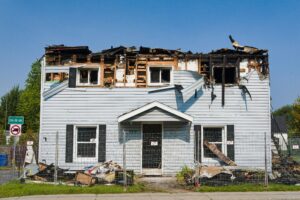Do You Live in a Flood Zone? Here’s How to Tell
Floods are the number one natural disaster risk in the United States. Living in a flood zone can pose potential threats such as increased dangers during severe weather and water damage to your property.
If you’re unsure if you live in a flood zone, here are some tips on how to find out.
Utilize the FEMA Flood Map
So where do floods happen?
The FEMA Flood Map is a comprehensive tool that shows if your area has a high chance of getting flooded. The Federal Emergency Management Agency provides this map as a public resource where you can input your address and easily identify your level of flood risk.
Flood zones are labeled with alphabetical letters, and this allows insurers to quickly identify proper rates in proportion to flood risk. This is also helpful for homeowners to understand what a specific flood zone could mean for your property:
- Zone A: The most common flood zone and means that you reside in a flood hazard area that isn’t coastal
- Zone B: Moderate flood hazard risk
- Zone C: Minimal flood hazard risk
- Zone D: Hazard level is not fully determined, but there’s a possible risk
- Zone V: High-risk areas with floods in coastal regions
- Zone X: Zones B and C are identified as Zone X on new flood maps
Set Up Reminders To Keep Track of Flood Zone Changes
Since floodplains change over time due to evolving topography and construction, it’s recommended that you keep track of flood zone changes. FEMA suggests checking your flood zone every five years. The best way to remind yourself to do this is to set a reminder on your phone or computer or keep track of milestones.
Take Advantage of Flood Sensors
Flood sensors are devices that alert you of any water leaks in your home. This may come from appliances or even leaks in your basement. You can find flood sensors that provide real-time alerts and even connect to your smartphone for consistent and accurate data.
Is Flood Insurance Mandatory?
Finding out if flood insurance is mandatory in your area is a good indicator that you live in a flood zone.
Insurance companies often have mandatory flood insurance plans if you live in a high-risk area, and you may want to take advantage of flood insurance even if it’s not required. It’s important to do your research and ensure that you’re fully covered in case of any natural disaster.
Reduce Your Flood Risk
Discovering that you live in a flood zone doesn’t mean that you should move, but it does mean that you should be prepared. Checking with FEMA for flood zones and changes along with getting excellent insurance coverage are excellent assets when living in a flood zone. Flood prevention can save you and your family’s life and protect your home.
Interested in more helpful home resources or want to keep up with the latest trends? Check out more articles from The Daily Blaze.












